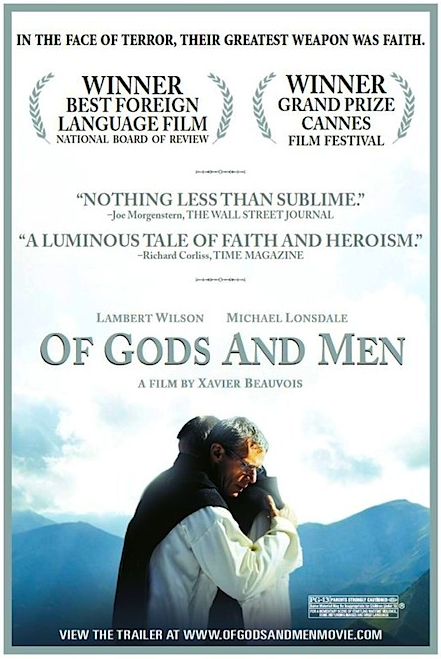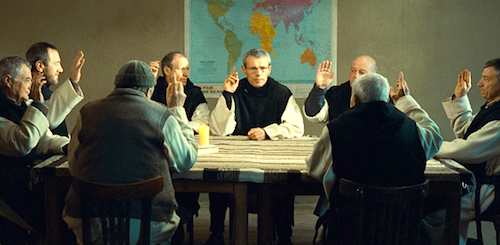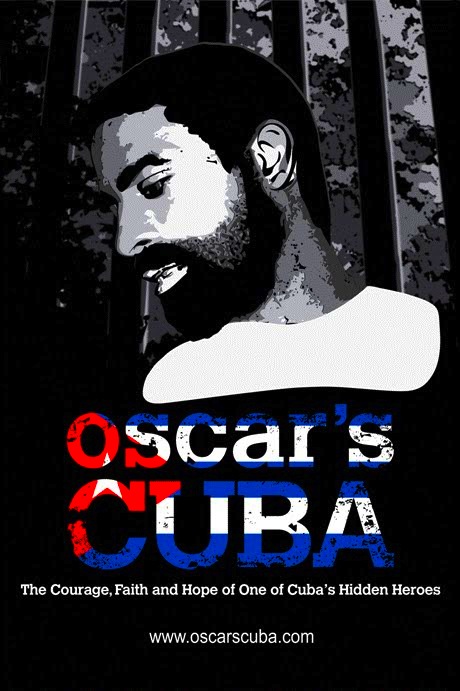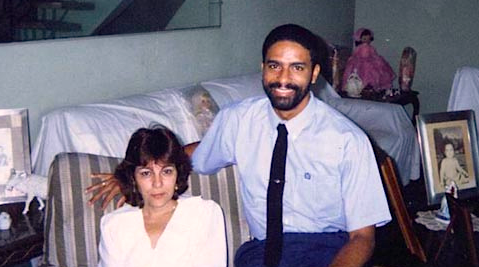By Joe Bendel. They lived in perfect harmony with their Muslim neighbors. Their mission was one of charity, conducted with tolerance, yet seven of their ranks were executed in 1996, either by Islamist guerillas (who claimed responsibility) or the Algerian army in an attempt to cover up a botched rescue attempt—opinions vary. Though a small group of French Trappist monks knew they were in harm’s way, they went about their final days just as they always had. Xavier Beauvois captures their faith and fellowship with genuine sensitivity while trying to finesse the worldly hatreds that ensnared them in his thinly fictionalized Of Gods and Men, the 2010 Cannes Grand Prix winner, which opens in New York and Los Angeles today.
 They do not reside in seclusion, but are actively engaged in their adopted community. The eight Trappists of Tibhirine do many good works, yet their daily existence is still comparatively quiet and meditative, filled with prayer and liturgical singing. Brother Luc runs the free clinic and distributes clothes to the needy. Brother Christian is a learned scholar of Islamic theology. Brother Christophe struggles with his faith, yet their provincial corner of Algeria is the only place he feels a sense of belonging.
They do not reside in seclusion, but are actively engaged in their adopted community. The eight Trappists of Tibhirine do many good works, yet their daily existence is still comparatively quiet and meditative, filled with prayer and liturgical singing. Brother Luc runs the free clinic and distributes clothes to the needy. Brother Christian is a learned scholar of Islamic theology. Brother Christophe struggles with his faith, yet their provincial corner of Algeria is the only place he feels a sense of belonging.
Unfortunately, the world around them is far from peaceful. As French Christians, they are prime targets for the Armed Islamic Group of Algeria. Fearing their presence will attract trouble, the Algerian government wants them to evacuate. However, many of their neighbors want them to stay, believing only the monks’ presence has protected them from the atrocities reported throughout the countryside. The dilemma for the monks is obvious: what course of action is most consistent with their mission and the tenets of their faith?
Working closely with monastic advisor Henry Quinson and choirmaster François Polgar, Beauvois renders their not-so cloistered life with respect and scrupulous attention to accuracy. The issues of faith the monks grapple with are serious, not just because of their obvious life-and-death implications. Indeed, Beauvois and co-screenwriter Etienne Comar offer the most insightful and compelling depiction of Christian monasticism seen on-screen since Into Great Silence, a film Men somewhat resembles in tone – despite the former being a documentary about Carthusians.
As befitting men of God, the monks forgive their captors (and likely executioners). It is their final act of Christian charity, explicitly elucidated in the concluding narration of Brother Christian’s journal. However, Beauvois’ constant pleas to distinguish Islam from Islamists run the risk of protesting too much. Frankly, he somewhat undercuts the feelings of humanist empathy and solidarity inspired by his graceful portrayal of the Trappists by fetishizing their murder as an act of martyrdom on behalf of their Muslim murderers. As not just men of the cloth, but as those trespassed against, it is their place and perhaps their highest calling to forgive. That right is not ours to exercise.

Despite the agenda ultimately appended to Men, it is a finely crafted film. Caroline Champetier’s warm lens finds the weathered beauty in the Algerian land and its people. Beauvois’ use of both silence and Polgar’s arresting chorale music is equally adept. Yet, it is the dignity and intelligence the cast invests in the monks that are redemptive above and beyond any pat message tacked onto their tragic story. Truly, the eight principles give career performances, but veteran French character actor Michael Lonsdale is a genuine standout as Brother Luc – while Lambert Wilson effectively centers the film as wise Brother Christian.
These are men, albeit of God, but men none-the-less, rather than symbols. The greatest aspect of Men is its success in delineating the monks as characters and conveying the distinct ways Christian faith manifests itself through their callings. Though it requires time to contemplate and digest, in the final analysis Men is a quietly moving film of considerable substance. It opens today (2/25) in New York at the Landmark Sunshine and next week in Los Angeles at Laemmle’s Playhouse 7.
Posted on February 25th, 2011 at 4:39pm.

